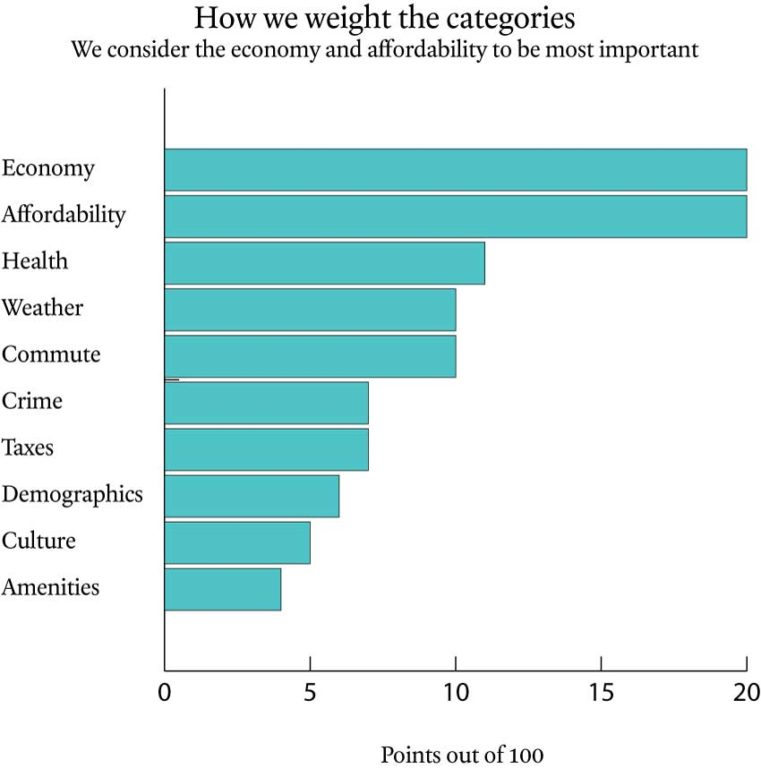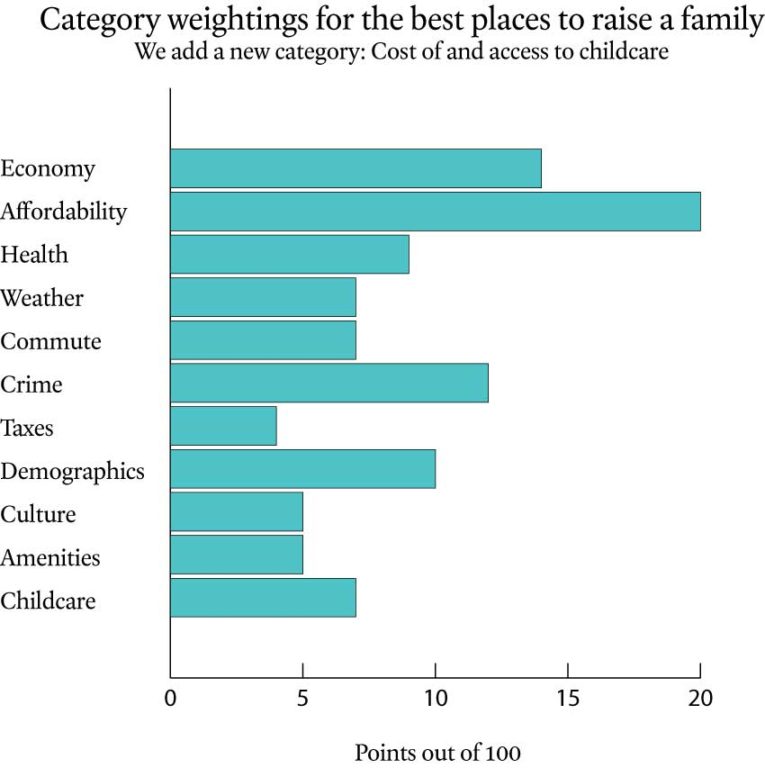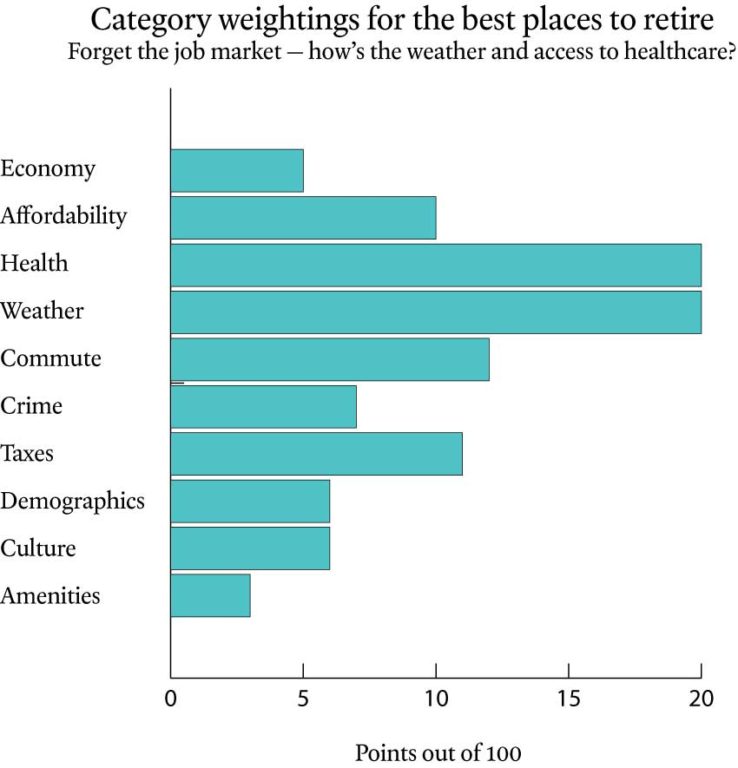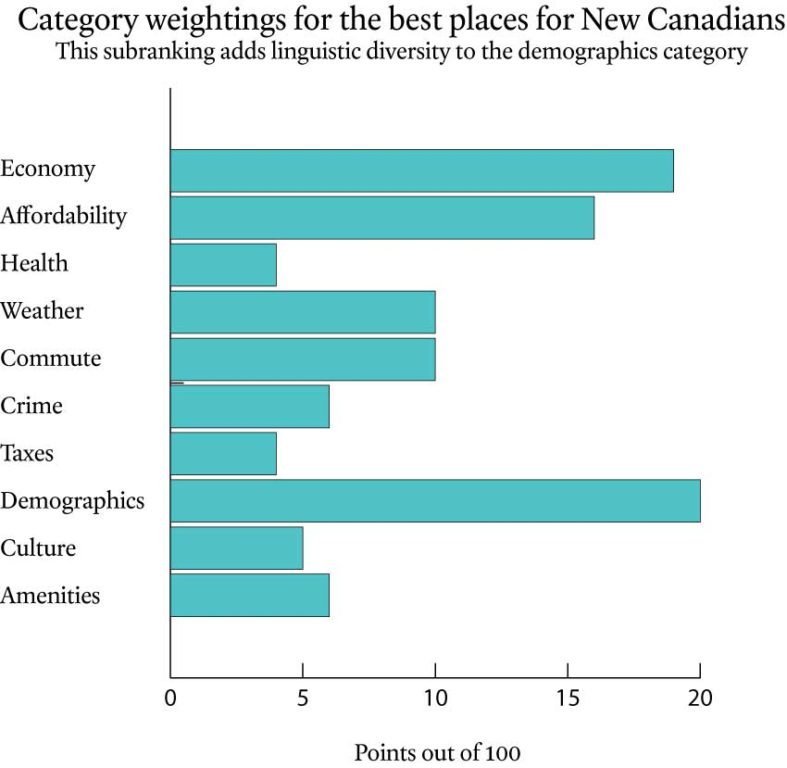Canada’s Best Places to Live 2018: Methodology
How we find the best of the best
Advertisement
How we find the best of the best
 We made a number of tweaks and adjustments to this year’s ranking. That means this year’s results are not directly comparable to previous years.
Two of the biggest changes we made were to the health category and the demographics category. The ranking now includes data on the median wait times for various medical procedures. We awarded points to cities where residents get faster access to surgeries and treatments.
The demographics category in the main ranking used to measure the five-year annualized population growth of cities against an ideal rate pegged at slightly above the national average, with cities penalized for growing faster or slower. While it’s true that fast-growing cities can face challenges, we believe those difficulties can be absorbed and addressed if local leaders are effective. We also didn’t want to penalize suburbs of major cities that are growing quickly because they’re building a lot of new housing, which is vitally important to address the affordability crisis in Vancouver and Toronto. As far as we’re concerned, if lots of people want to move to a city, that’s a good sign — and if the municipality is doing a bad job of handling that growth, it’s likely to be reflected in other areas of the ranking.
[bc_video video_id=”6022484820001″ account_id=”6015698167001″ player_id=”lYro6suIR”]
A note on how we define a “city:” We examined the largest of what Statistics Canada calls “census subdivisions,” defined geographical boundaries that usually encompass a municipality. Sometimes Statistics Canada uses names that are different from those in common usage — for example, if you’re looking for Fort McMurray, Alta., the name of its census subdivision is Wood Buffalo.
Here’s how we determine how the cities score in each category. Unless otherwise noted, we award points by ranking all 415 cities in each sub-category, giving full points to the city that does the best, close to zero points to the city that does the worst and something in between for the rest of the cities on a curve. In cases where data was not available for every city, we substituted a comparable value — for example, for cities where there was no data on rental prices, we substituted the weighted average of rental prices in the same economic region. We cut two cities from the ranking this year — Whitehorse and Yellowknife — because we would have had to make too many substitutions for missing data to obtain an accurate final result.
Wealth and Economy: 20 points. We awarded those points based on the following subcategories:
We made a number of tweaks and adjustments to this year’s ranking. That means this year’s results are not directly comparable to previous years.
Two of the biggest changes we made were to the health category and the demographics category. The ranking now includes data on the median wait times for various medical procedures. We awarded points to cities where residents get faster access to surgeries and treatments.
The demographics category in the main ranking used to measure the five-year annualized population growth of cities against an ideal rate pegged at slightly above the national average, with cities penalized for growing faster or slower. While it’s true that fast-growing cities can face challenges, we believe those difficulties can be absorbed and addressed if local leaders are effective. We also didn’t want to penalize suburbs of major cities that are growing quickly because they’re building a lot of new housing, which is vitally important to address the affordability crisis in Vancouver and Toronto. As far as we’re concerned, if lots of people want to move to a city, that’s a good sign — and if the municipality is doing a bad job of handling that growth, it’s likely to be reflected in other areas of the ranking.
[bc_video video_id=”6022484820001″ account_id=”6015698167001″ player_id=”lYro6suIR”]
A note on how we define a “city:” We examined the largest of what Statistics Canada calls “census subdivisions,” defined geographical boundaries that usually encompass a municipality. Sometimes Statistics Canada uses names that are different from those in common usage — for example, if you’re looking for Fort McMurray, Alta., the name of its census subdivision is Wood Buffalo.
Here’s how we determine how the cities score in each category. Unless otherwise noted, we award points by ranking all 415 cities in each sub-category, giving full points to the city that does the best, close to zero points to the city that does the worst and something in between for the rest of the cities on a curve. In cases where data was not available for every city, we substituted a comparable value — for example, for cities where there was no data on rental prices, we substituted the weighted average of rental prices in the same economic region. We cut two cities from the ranking this year — Whitehorse and Yellowknife — because we would have had to make too many substitutions for missing data to obtain an accurate final result.
Wealth and Economy: 20 points. We awarded those points based on the following subcategories:
 Sub-ranking: Best Places to Retire
There are certain things you don’t have to worry about any more when you retire, such as finding a job or getting a university education. Other things, like healthcare and weather, become more important. To find the best place to retire, we reduced the weighting of or eliminated the former and beefed up the importance of the latter.
Sub-ranking: Best Places to Retire
There are certain things you don’t have to worry about any more when you retire, such as finding a job or getting a university education. Other things, like healthcare and weather, become more important. To find the best place to retire, we reduced the weighting of or eliminated the former and beefed up the importance of the latter.


Share this article Share on Facebook Share on Twitter Share on Linkedin Share on Reddit Share on Email
Ladies and gentlemen- Oakville is the best place to live in the whole of Canada! MOney sense folks please write with common sense!